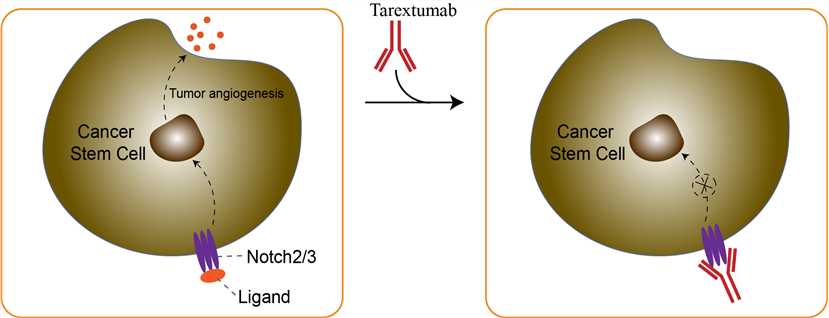Tarextumab Overview
Introduction of Tarextumab
Tarextumab (formerly OMP-59R5, anti-Notch2/3) is a novel anti-cancer stem cell antibody identified by screening against the Notch3 receptor that binds to and prevents signaling through both the Notch2 and Notch3 receptors. This drug has been shown in preclinical models to have broad-spectrum anti-tumor activity via inhibition of cancer stem cell growth, and promoting cell differentiation, as well as disrupting tumor angiogenesis by inhibiting vascular pericytes. It is being tested as a possible treatment for cancer. In Jan 2015, he US Food and Drug Administration (FDA) has granted orphan drug designation to tarextumab for the treatment of pancreatic cancer and lung cancer. The drug was well tolerated with a manageable toxicity profile. Two early stage clinical trials have reported encouraging results and it was in combination with etoposide and platinum (EP) in patients with untreated extensive-stage SCLC, proved to be well-tolerated and showed dose-dependent anti-tumor activity.
Mechanism of Action of Tarextumab
The Notch pathway is one of several key pathways linked to both stem cell biology and cancer. In particular, dysregulated Notch2 and/or Notch3 activity has been associated with several human tumor types, including lung, ovarian, breast, pancreatic, and colon cancers. In addition to its role in developmental biology and cancer, Notch signaling also plays a key role in tumor vasculature and pericytes. Thus, therapeutic strategies directed at inhibition of the Notch2/3 pathway on tumors and vasculature may offer promise for the treatment of solid tumors. Accumulating evidence has indicated that tumors are frequently composed of heterogeneous cell types that vary in their ability to initiate new tumor growth and that cancer stem cells (CSC, also referred to as tumor-initiating cells) drive tumor growth and progression and are relatively resistant to many existing therapies, including conventional chemotherapy and radiation treatments. Because aberrant Notch signaling has been implicated in cancer, cancer stem cells, and tumor vasculature, therapeutic strategies that effectively target Notch signaling could have a major impact on cancer patient survival. Although inhibition of Notch receptor cleavage enzymes by gamma-secretase inhibitors (GSI) have been developed and progressed in the clinic, the therapeutic utility of these compounds is limited due to intestinal toxicity resulting from pan-Notch inhibition. Tarextumab is a monoclonal antibody directed against the Notch receptor with potential antineoplastic activity. it binds to Notch on the cell surface, thereby inhibiting Notch-mediated signaling and gene transcription, which may impede tumor angiogenesis. Notch receptors are important for cell-cell communication, which involves gene regulation mechanisms that control multiple cell differentiation processes during embryonic and adult life. Dysregulated Notch signaling is implicated in many diseases including T-ALL (T-cell acute lymphoblastic leukemia), CADASIL (cerebral autosomal dominant arteriopathy with sub-cortical infarcts and leukoencephalopathy), MS (multiple sclerosis), and many other disease states.

Fig.1 Mechanism of action of Tarextumab
For research use only. Not intended for any clinical use.
This site is protected by reCAPTCHA and the Google Privacy Policy and Terms of Service apply.

